

Turkey, Republic of, and the Armenian Genocide. Turkey is the successor state of the Ottoman Empire, and its official policy on the Armenian Genocide is the denial of its occurrence.
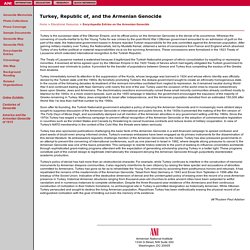
Whereas the convening of courts-martial to try the Young Turks for war crimes by the post-World War I Ottoman government amounted to an admission of guilt on the part of the state, the Nationalist government based in Ankara rejected Turkish responsibility for the acts committed against the Armenian population. After gaining military mastery over Turkey, the Nationalists, led by Mustafa Kemal, obtained a series of concessions from France and England which absolved Turkey of any further political or material responsibilities vis-à-vis the surviving Armenians.
These concessions were formalized in the 1923 Treaty of Lausanne which extended international recognition to the Turkish Republic. The Treaty of Lausanne marked a watershed because it legitimized the Turkish Nationalist program of ethnic consolidation by expelling or repressing minorities. Turkey must end its 100 years of genocide denial. Exactly 100 years ago, on 24 April 1915, the Turkish government arrested 250 Armenian intellectuals and cultural leaders in Constantinople, so beginning the Armenian genocide.

From late spring of 1915, massacres were carried out throughout Turkey. The government organised the genocide by creating death squads, passing laws to sanction deportation and confiscation, using the then cutting-edge railway and telegraph technology, and wrapping the whole thing up in the nationalist ideology of pan-Turkism. The US consul in Aleppo, Jesse B Jackson, called it “a gigantic plundering scheme, as well as the final blow to extinguish the [Armenian] race”. By 1918, between a half and two-thirds of the 2 million Armenians living in their historic homeland in the Ottoman empire had been annihilated. What Obama’s Refusal to Acknowledge the Armenian Genocide Tells Us About the U.S. — and the Rest of the World.
(This post is from our new blog: Unofficial Sources.)
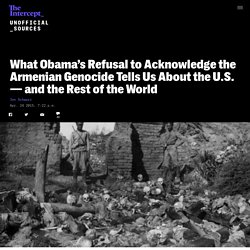
Today, April 24, 2015, is the 100th anniversary of the beginning of the Armenian Genocide. During the next several years, about one and a half million Armenians were murdered by the Ottoman Empire: shot, worked to death, or marched into the Syrian desert to starve or die of thirst. An American official who was an eyewitness wrote home, “The whole country [is] one vast charnel house, or, more correctly speaking, slaughterhouse.” For most Americans, this seems like it happened a million years ago on another planet. Armenian massacres: What happened during the genocide and why does Turkey deny it? Across eastern Turkey, long columns of Armenians were ambushed by soldiers and Kurdish gangs, who slaughtered them by the hundreds of thousand.
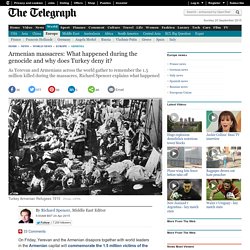
Instructions from provincial Ottoman officials, notably the governor of Diyarbakir province Mehmed Reshid, gave impunity to the attackers, many of whom plundered and looted Armenian property. The killings were carried out under the glare of international publicity, including from missionaries - America was yet to join the war, and dramatic witness accounts of hundreds of people being killed, or even burned alive, appeared in the western press. Thecostofdenial. ARMENIAN GENOCIDE CENTENNIAL. Turkey, Armenians Dispute ‘Genocide’ Century Later. As the Ottoman Empire was collapsing during World War I, violence on a massive scale resulted in the deaths of up to 1.5 million ethnic Armenians in a campaign of mass expulsion.
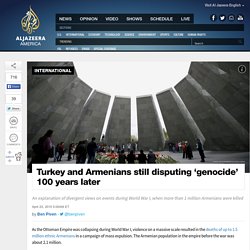
The Armenian population in the empire before the war was about 2.1 million. But how to categorize the events is a prickly issue for today’s Turkey. Armenian National Institute. Armenian Genocide denial. Armenian Genocide denial refers to the denial of the genocide against (already systematically discriminated) Armenians committed by the Ottoman Empire under the rule of the Young Turks from 1915 to 1918.
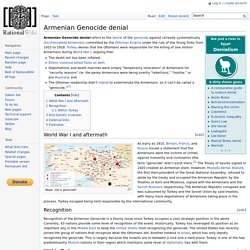
Turkey denies that the Ottomans were responsible for the killing of one million Armenians during World War I, arguing that: The death toll has been inflated; Ethnic violence killed Turks as well; Deportations and death marches were simply "temporarily relocation" of Armenians for "security reasons" (ie. the pesky Armenians were being overtly "rebellious," "hostile," or pro-Russian); and The Ottoman leadership didn't intend to exterminate the Armenians, so it can't be called a "genocide.
"[1] [edit] World War I and aftermath Nope, not a genocide! US academics join rush to deny Turkish massacre of Armenians - World - News - The Independent. Thanks to the diligent work of the Turkish embassy in Washington, a group of passive US congressmen and pro-Turkish academics at several leading American universities, the century's first holocaust - in which 1.5 million Armenians were slaughtered - is being transformed, against all the evidence to the contrary, into a mere side-effect of the First World War rather than a deliberate act of race persecution.
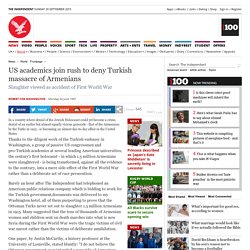
Barely an hour after The Independent had telephoned an American public relations company which is bidding to work for the Turkish government,documents was delivered to my Washington hotel, all of them purporting to prove that the Ottoman Turks never set out to slaughter 1.5 million Armenians in 1915. Many suggested that the tens of thousands of Armenian women and children sent on death marches into what is now Syria during the First World War were the tragic victims of civil war unrest rather than the victims of deliberate annihilation.
Armenian Genocide denial. The denial of the Armenian Genocide is the assertion that the Armenian Genocide did not occur in the manner or to the extent described by scholarship.
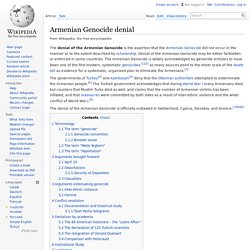
Denial of the Armenian Genocide may be either forbidden or enforced in some countries. The Armenian Genocide is widely acknowledged by genocide scholars to have been one of the first modern, systematic genocides,[1][2] as many sources point to the sheer scale of the death toll as evidence for a systematic, organized plan to eliminate the Armenians.[3] Turkey Will Continue to Deny an Armenian Genocide. Historical evidence indicates that during World War I, Ottoman leaders — specifically Mehmet Talat, Ismail Enver and Ahmet Cemal, the Young Turk triumvirate — decided to eliminate Anatolia’s Armenians.
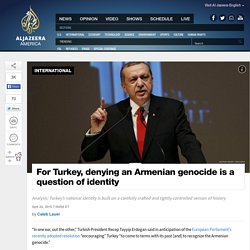
On April 24, 1915, the day before Britain and France attacked at Gallipoli, some 250 Armenian notables in Istanbul were arrested, packed into trains and sent to join the hundreds of thousands of other Armenians soon to be massacred or driven out to their deaths in the Syrian desert. Children were kidnapped. Property was seized. The Burning Tigris The Armenian Genocide and America's Response. Fires of Hatred Ethnic Cleansing in Twentieth-Century Europe.
The Armenian Journey - A Story Of An Armenian Genocide.